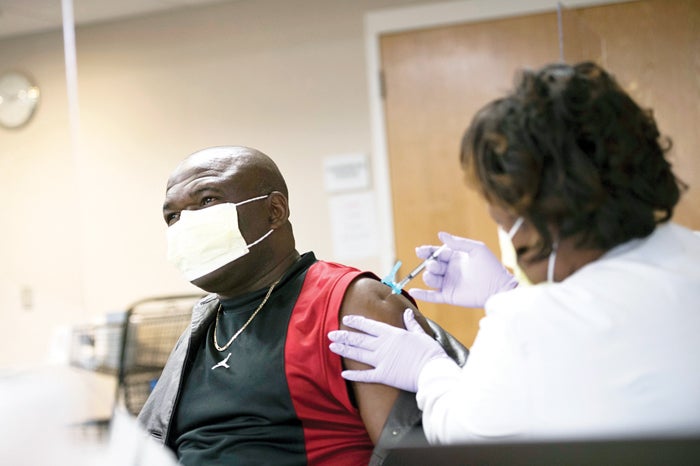What you need to know about the Johnson & Johnson single-dose vaccine
Published 12:00 am Thursday, March 11, 2021
|
Getting your Trinity Audio player ready...
|
“Having three COVID vaccines that are highly effective is unbelievably good news.”
By Page Leggett
Novant Health
Three’s not a crowd in the case of COVID-19 vaccines.
The Johnson & Johnson (Janssen) single-dose vaccine is heading to North Carolina following Emergency Use Authorization by the U.S. Food and Drug Administration (FDA).
The vaccine is 85% effective at preventing severe cases of COVID-19 and 72% effective at preventing moderate cases. According to Johnson & Johnson, the vaccine offers complete protection in preventing hospitalization and death as a result of the virus.
“Remember: the influenza vaccine has an effectiveness of 35% to 55%,” said Dr. David Priest, Novant Health senior vice president and chief safety and quality officer. “So, the fact that we have three vaccines for COVID that have an 82% or higher effectiveness rate against the most serious complications is unbelievably good news.”
Advantages of the J&J vaccine
This vaccine works differently in the body than the two-dose vaccines, which is why you need just one dose. It’s also easier to store and transport because it doesn’t have to be kept at super-cold temperatures. That means it’s easier to distribute.
The Johnson & Johnson (Janssen) vaccine is “infinitely more transportable to areas that are a little bit more challenging to reach — rural areas or individuals who may be sick and shut in,” said Dr. Jerome Williams, Novant Health senior vice president of consumer engagement.
Deeper details
This vaccine uses “viral vector technology.” Viral vector vaccines use a modified version of a different virus as a vector to deliver instructions, in the form of genetic material (a gene), to a cell. The vaccine does not cause infection with either COVID-19 or the virus that is used as the vector. The two-dose vaccines use messenger RNA, or mRNA, that teach the body how to make a protein to trigger an immune response to COVID-19.
Priest also noted that while Johnson & Johnson is the vaccine name most are familiar with, it was actually co-developed by Johnson & Johnson and Janssen. Therefore, patients who receive this vaccine will see Janssen in their medical record, not Johnson & Johnson.
The vaccine is for ages 18 and older.
Possible side effects
Possible expected effects, or side effects, from the Johnson & Johnson vaccine are the same as the two-dose vaccines — a sore arm, fever, headache or feeling tired and achy for a day or two.
Getting vaccinated is the most important thing
“Our goal remains the same — to meet people where they are in the community,” Priest said. “Having a third vaccine on the market is promising and will hopefully lead to more weekly allocations, which in turn, leads to more people getting vaccinated.”
Given the limited vaccine supply, people are not able to choose the type of vaccine they get. All vaccines currently available are safe and protect against COVID-19. “Regardless of which vaccine you receive, you will be better protected than if you did not receive a vaccine,” Priest said. “The most important thing right now is to get as many people vaccinated as possible.”
Changes in North Carolina vaccine eligibility
Eligibility in North Carolina has now been extended to Group 3.
“We are hopeful that an increase in group eligibility will lead to an increase in vaccine allocation,” said Nikki Nissen, vice president of clinical operations and chief nursing officer. “As part of our commitment to the community, we want to support getting these essential workers vaccinated, and we’re working as hard as we can to ensure the most equitable and efficient distribution, given the low supply and the high demand.”
Community vaccination events throughout Novant Health’s territory continue to serve as many people as supplies allow. Every shot gets America closer to returning to something approaching normal.
Anyone, regardless of group, can preregister for an appointment at GetVaccinated.org
When it’s your turn, you’ll receive a MyChart notification, which allows you to sign up for an appointment when one is available. Patients who do not have a MyChart account are encouraged to register for one at MyNovant.org.



